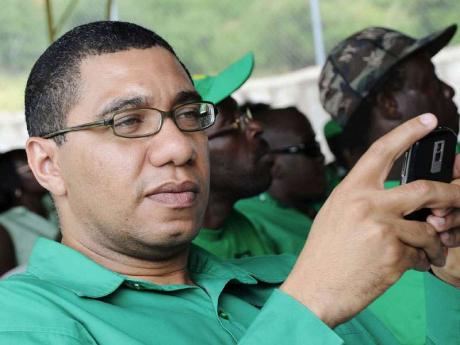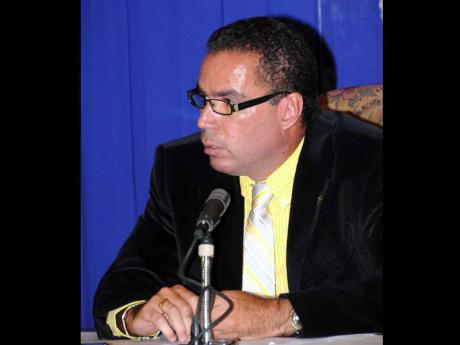The Jamaica Labour Party's troubles
Robert Buddan, Contributor
The Jamaica Labour Party (JLP) held its annual conference last weekend. It would have wanted to have a conference under better circumstances. Instead, it found itself in a defensive, even embarrassing position. The public session of the conference, which the party leader addressed, was devoted to defending the selection of the commissioners for the Manatt enquiry; and the allegations against Minister James Robertson of fomenting violence and soliciting murder.
This story has now appeared in the South Florida Caribbean News, another tarnishing of Jamaica's image. On top of these, the party is still in the throes of internal fighting for positions of deputy leadership, chairmanship and for general secretary, and the power that goes with these positions. The conference also came against the most recent Don Anderson-CVM TV polls, which are not kind to the party's reputation on corruption. And, as if to try and stem working-class anger towards the Labour government, the Bustamante Industrial Trade Union, the party's affiliate union, tried to calm the mood of the (JLP) working class, during these heady times of recession and the JLP-International Monetary Fund (IMF) policies.
Explosive potential
The conference had such potential for explosion that much attention was paid to making sure no guns or other weapons were brought into the conference. In 2008, one man was shot and two others injured in the National Arena, where the conference was held. Since then, the many fallouts in the party over the Coke extradition, police action against Tivoli Gardens, and allegations of violence against Robertson, must have given great cause to make party officials nervous. Thankfully, the shooting episode was not repeated. Also, there must have been fear that the fighting factions might cast such a dark shadow over the conference that the party might not be able to put up a good show.
The announced commission of enquiry into the Manatt scandal seemed to have served its immediate purpose. It brought the factions together for the conference, and the party leader tried to rally the party by attacking the common enemy, the People's National Party (PNP), instead.
But the underlying problems remain. The Jamaica Observer of November 22 raised this prospect the day right after the conference: "Is it possible that as elections approach, the JLP might feel it would be improving its chances by ditching its tarnished leader - replacing him with one of its bright, Young Turks?" It even noted that Golding had referred to "restlessness for change" in the party. Such are the troubles facing the party that three years after coming to power, there have been calls for Golding to resign, and those calls get more anxious as the next elections near.
According to the Don Anderson-CVM TV polls, nearly three-quarters of Jamaicans were aware of the Manatt affair, and they seemed clear in their opinions. Almost all who were aware of it thought that the JLP leader, Bruce Golding, was responsible. This is the tarnished image that the Observer spoke about. Sixty-seven per cent of Jamaicans thought Golding was primarily responsible. Only 10 per cent thought Brady was, even though Golding had tried to pass the blame to him. And, only three per cent thought Karl Samuda was responsible, even though some in the JLP argued that as general secretary he should take the blame.
The trouble for the JLP is not just that its leader's image is tarnished. The image of the entire party is tarnished. Jamaicans believe that the JLP is more corruptp (25 per cent) than the PNP (16 per cent). In those three years since coming to power, the JLP has managed to undermine its chief campaign line, that the PNP was the most corrupt party in Jamaica since Independence. In fact, in the last year leading up to the election, the JLP used the Trafigura affair as the case to hammer this line home. Yet, the Anderson-CVM TV polls now show that the JLP has outdone the PNP in these three years, in the public's estimation. The public thought the Manatt scandal is worse than the Trafigura scandal by 47 per cent to 17 per cent, a difference of almost 3:1.
In the end, 49 per cent of Jamaicans thought that Golding should resign. Portia Simpson Miller never had this blight against her image because of Trafigura. She acted more decisively and forthrightly. Golding's apology has not let him off the hook. His mode of selecting a commission of enquiry into the Manatt scandal has not satisfied many either.
New leadership
Three years after winning power, albeit by the slimmest of margins, the JLP finds itself behind the PNP by 10 per cent. Does the party need a new leader and who might that person be? Jamaicans were clear about this too. Andrew Holness came out head and shoulders above everyone else.
Twenty-seven per cent of Jamaicans think Holness is the logical successor to Golding. No one else comes close. The next in line are Shaw and Vaz (six per cent each). That might not sound appetising at all. There is a dearth of leadership material in the JLP. Holness, himself, might not have the political muscle or the courage to stand up to these who seek to push him out to the margins.
The potential line-up for the next leadership is not inspiring. Deputy Leader James Robertson is now mired in controversy, though not for the first time. The young Turks of which one newspaper spoke are not all without their own tarnished image. And Holness might not be the favourite of many among these young Turks. In the messy leadership race to replace Edward Seaga he, to his credit, had complained about the disrespect shown by many younger, ambitious members of the party. He kept his distance from them.
One therefore has to wonder about the second-tier leadership that is moving into position in the JLP. They are shutting out Karl Samuda and Horace Chang, two allies of the post-Seaga leadership. They are putting in Daryl Vaz, who might well be the power behind the Golding throne, and Christopher Tufton, both of whom seem to be on the Golding wing of the party, the very wing that is tarnished.
The party needs to do serious soul-searching and rebuilding. There is no sense that any of this is going on. Because of the very marginal victory in 2007, the JLP cannot afford to lose any of its support. But this is pre-cisely what has happened. Just less than half (47 per cent) of those who voted for the party in 2007 say they would not vote for the party the next time. Still, what did not come out of the conference was a sense of the change that the party was restless for, or the kind of change that would make the party transparent and accountable. There was nothing about the party's constitution, transparent campaign financing, ethics and discipline, and the party's connection with garrison politics and violent politicians.
Robert Buddan lectures in the Department of Government, UWI, Mona. Email: Robert.Buddan@uwimona.edu.jm or columns@gleanerjm.com .


